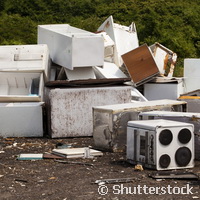Advanced technologies for tracing waste electrical and electronic equipment
Every year, Europe alone produces nine million tonnes of waste electrical and electronic equipment (WEEE). In spite of legislation already in place, less than 40 percent of this is treated according to legal and environmental requirements. By using radio-frequency tagging or image recognition, the EU-funded project WEEE TRACE ('Full traceability of the management of WEEE') hopes to harness information and communication technologies in the fight against illegal exportation and substandard treatment of WEEE. "Improper treatment can result in the emission of hazardous substances into the environment," says project coordinator Josu Rollón of Spain's MCCTelecom. "This includes ozone depleting substances like chlorofluorocarbons (CFCs), greenhouse warming gases, oils, and other substances." The WEEE TRACE project is attaching intelligent radio-frequency tags to waste items when they are collected so they can be traced-and-tracked along the route to a treatment plant. Trackers can then determine where the waste is and how it is being managed, helping to ensure the materials are properly recycled. Rollón adds: "Our system is currently in an advanced deployment phase in Spain and so far we have tagged over 7000 tonnes of WEEE, which has been conveyed to the appropriate recycling facilities. We expect to reach more than 12 000 tonnes managed in 2013." Ultimately, WEEE TRACE researchers hope to increase the amount of waste legally collected and treated by 33 percent compared to 2009 figures. This will result in a 12 percent reduction in CO2 emissions, which includes the collection and treatment of greenhouse gases from discarded refrigerators. "Every person in Europe generates above 10 kilos per year of these waste items and many of them contain hazardous substances that must be properly treated," says Rollón. "Moreover, this waste stream is growing. But it also contains valuable resources that should be recovered." Rollón says the project's use of intelligent tags can also be applied in other types of waste. "The system increases efficiency in the collection and management of waste and reduces associated administrative activities. Thus, the unit cost for collection and recycling can also be reduced, we estimate by 10 percent." WEEE TRACE received over EUR 1.1 million in EU funding under the eco-innovation programme, which is aimed at supporting environmental projects that can make a difference in the marketplace. The project runs until July 2014.For more information, please visit:WEEE TRACE websitehttp://www.weee-trace.euProject factsheethttp://www.eaci-projects.eu/eco/page/Page.jsp?op=project_detail&prid=2015MCCTelecomhttp://www.mcctelecom.es/
Countries
Spain



